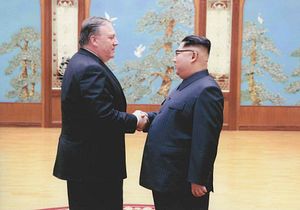In the recent movie Ready Player One, the game OASIS functions as a dreamland where everyone can experience and realize their fantasies, which are being oppressed in the real world. However, when the game’s designer dies he leaves a quest to determine who will own the OASIS, with “Player One” the coveted top spot on the scoreboard. Naturally, in the film, this “Player One” finally wins after a tortuous battle in which justice triumphs over evil. “Player One” becomes a winner who takes all, and ultimately it is a happy and joyful ride for movie fans.
There has been another “game” being played in the Korean Peninsula, between Washington and Pyongyang. Although not a Hollywood-style game between good and evil, the labyrinthine evolution of the storyline is reminiscent of Steven Spielberg’s movie. After hitting one snag after another, U.S. President Donald Trump finally reaffirmed the proposed meeting with North Korean leader Kim Jong-un in Singapore on June 12, 2018. In the meantime, Kim carried out the promises that were made during the inter-Korea summit in April and has shown a substantive political willingness for peace and reconciliation, including releasing three American prisoners and dismantling North Korea’s nuclear test site.
Amid the restless back and forth of the past weeks, the United States and North Korea have agreed to continue to work on the preparations for the coming summit. But now, it seems they have come to a real deal: Which comes first, complete, verifiable, and irreversible denuclearization (CVID), or security and economic assurance?
This is a significant question. To continue the metaphor, either side could be “Player One” if its bargain is accepted and the other side makes a compromise. But given the complexity of the Korean Peninsula issue, this idea is just an illusion. North Korea is not and will not choose to be Libya, just as much as the United States will not tolerate a bold nuclear threat from Pyongyang. Therefore, the perplexed standoff over “which comes first” contributes nothing but more misunderstandings and distrust that might just put the future talks in danger once again. World politics, including the Korean Peninsula issue, has never been a simple matter of black and white, and thus binary opposition does not help.
Moreover, on the Korean Peninsula issue — which includes the questions of denuclearization, peace, and reconciliation — no one should claim the role of “Player One,” no matter how sophisticated the strategic considerations, political expectations, and geopolitical calculations. The United States especially should understand the importance of the tactic of “progressive and synchronous implementation” on the issue of denuclearization. First, this approach means that no party will dominate the other side, especially at the beginning of the process, when there is a minimum level of trust. Second, progressive and synchronous implementation is the key to making the whole denuclearization process progressively and practically feasible and more importantly, verifiable.
Therefore, in the protracted and still evolving game between the United States and North Korea, no one wins unless both win.

































